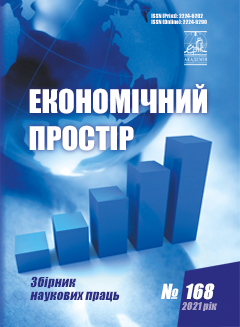ІСТОРИЧНІ АСПЕКТИ РОЗВИТКУ АНТИКОРУПЦІЙНОЇ ПОЛІТИКИ
Анотація
У статті розглянуто історичні аспекти розвитку явища корупції від найдавніших часів до сьогодення. Під час дослідження було проаналізовано існуючі погляди різних мислителів щодо цього негативного явища. Виявлено, що аналіз корупції як негативного соціального явища не є можливим без дослідження її історичного минулого, накопичення знань щодо розуміння передумов її виникнення та поширення на певній території. Дослідження історичних аспектів розвитку корупції сприяє більш об’єктивній адаптації до змін та більш точному прогнозуванню протидії цьому явищу в майбутньому. Під час аналізу історичних аспектів розвитку антикорупційної політики спробували дослідити основні витоки цього негативного явища, її еволюцію, природу походження, адже вивчення історичного досвіду сприятиме позитивним змінам в умовах сьогодення. Виявлено, що всі згадки про корупцію як негативне соціально-економічне, політичне, правове та моральне явище виникають у результаті неефективного використання державних службовців своїх службових повноважень. Статтю побудовано на гіпотезі, що історичні аспекти розвитку антикорупційної політики необхідно поглибити та об’єктивно оцінити зв'язок минулого із сучасністю, щоб прогнозувати протидію у майбутньому. Дослідження ґенези, її наукове осмислення через історичні аспекти розвиту в суспільстві сприятимуть формуванню об’єктивних висновків, уникаючи існуючих помилок попереднього покоління, завдяки використанню напрацьованого досвіду. Дослідження історичних аспектів розвитку антикорупційної політики є актуальним завдяки існуванню нагальної потреби у виявленні та вдосконаленні сучасних механізмів попередження виникнення та поширення цього складного негативного суспільного явища з урахуванням його складної та довготривалої історії розвитку, що має певні відмінності в різних країнах, але несе такі ж соціально-політичні та економічні наслідки.
Посилання
Артемьев А.Б. Коррупция в механизме функционирования государства (теоретико-правовое исследование в рамках эволюционного подхода) : дис. ... канд. экон. наук : 12.00.01 ; Российская академия народного хозяйства и государственной службы при Президенте Российской Федерации. Москва, 2014. 442 c.
Ахметова Г.Р. Коррупция в нефтедобывающих странах : учебное пособие. Алматы : Кульжахан, 2002. С. 14–15.
Бєльська Т. Корупція як фактор негативного впливу на взаємовідносини органів публічної влади та інститутів громадського суспільства. Державне управління та місцеве самоврядування. 2009. Вип. 1(1). С. 110–117.
Грубінко А.В. Iсторiя держави i права зарубiжних кpaїн та римське право. Тернопiль : ТНПУ ім. В. Гнатюка, 2019. 384 с.
Грушевський М. Історія України-Руси. URL: litopys.org.ua.
Качкина Т.Б., Качкин А.В. Коррупция и основные элементы стратегии противодействия ей : учебное пособие. Ульяновск : Печатный двор, 2010. С. 24.
Клейменов М.П., Пустовит Р.В. Профилактика коррупции. Актуальные проблемы экономики и права. 2010. № 4(16). С. 83–89.
Клімова С.М., Ковальова Т.М. Організаційно-правове забезпечення сучасної антикорупційної політики. Харків : Харківськ. регіональн. ін-т держ. управління, 2015. 252 с.
Кожушко А.С. Коррупция: социально-культурный и исторический контекст. Общество. Среда. Развитие (Terra Humana). 2011. № 4. С. 183–186.
Ницше Ф. Воля к власти. Минск, 1999. С. 104, 368.
Савчук О.П., Бабич В.Л., Бабич В.А. Корупція: багатоаспектність явища : навчальний посібник. Ірпінь : НУ ДПС України, 2009. 68 с.
Сидихмеинов В.Я. Китай: страницы прошлого. Москва, 1978. С. 241–243.
Синюкова Т.Н. Понятие и подходы к содержанию коррупции. Юридическая наука и практика. Вестник Нижегородской академии МВД России. 2015. № 1(29). С. 333–337.
Сура аль-Бакара. URL: http://quran.e-minbar.com/tafsir/assaadi/2/188/.
Томсинов В.А. Государство и право Древнего Египта : монография. Москва : Зерцало-М, 2011. С. 279–281.
Чечуров А.В. Коррупция: историко-философская ретроспектива. Вестник Волгоградского государственного университета. Серия 7: Философия, социология и социальные технологии. 2010. № 2(12). С. 158–163.
Энгельс Ф. Происхождение семьи, частной собственности и государства: в связи с исследованиями Л.Г. Моргана. Москва : Политиздат, 1970.
Barnick, K., Braemer, J., Ludwig, J. (2007). Korruption – (kleine) Geschichte der Bestechung.
Artem'ev, A.B. (2014) Korrupcija v mehanizme funkcionirovanija gosudarstva (teoretiko-pravovoe issledovanie v ramkah jevoljucionnogo podhoda) [Corruption in the mechanism of functioning of the state (theoretical and legal research in the framework of the evolutionary approach)]. Candidate’s thesis. Moscow. (in Russian).
Ahmetova, G.R. (2002) Korrupcija v neftedobyvajushhih stranah. Almaty. Izdatel'stvo “Kul'zhahan”, pp.14–15. (in Russian).
Bjel's'ka, T. (2009) Korupcija jak faktor negatyvnogo vplyvu na vzajemovidnosyny organiv publichnoi' vlady ta instytutiv gromads'kogo suspil'stva. [Derzhavne upravlinnja ta misceve samovrjaduvannja]. vol, 1(1). pp. 110–117. (in Ukrainian).
Grubinko, A.V. (2019) Istorija derzhavy i prava zarubizhnyh kpai'n ta ryms'ke pravo. Ternopil': V: TNPU im. V. Gnatjuka. 384 р.
Grushevs'kyj, M. Istorija Ukrai'ny-Rusy. Available at: litopys.org.ua (in Ukrainian).
Kachkina, T.B. (2010) Korrupcija i osnovnye jelementy strategii protivodejstvija ej. Ul'janovsk: OAO «Oblastnaja tipografija «Pechatnyj dvor». 24р. (in Russian).
Klejmenov, M.P. & Pustovit, R.V. (2010) Profilaktika korrupcii Aktual'nye problemy jekonomiki i prava. vol 4 (16). pp. 83-89 (in Russian).
Klimova, S.M. & Koval'ova, T.M. (2015) Organizacijno-pravove zabezpechennja suchasnoi' antykorupcijnoi' polityky. Harkiv : Harkivs'k. regional'n. in-t derzh. Upravlinnja. 252 p. (in Ukrainian).
Kozhushko, A.S. (2011) Korrupcija: social'no-kul'turnyj i istoricheskij kontekst. Obshhestvo. Sreda. Razvitie (Terra Humana). vol 4. pp. 183-186 (in Russian).
Nicshe, F. (1999) Volja k vlasti. Minsk. pp. 104, 368. (in Russian).
Savchuk, O.P., Babych, V.L. & Babych, V.A. (2009) Korupcija: bagatoaspektnist' javyshha Irpin': NU DPS Ukrai'ny. 68 p. (in Ukrainian).
Sidihmeinov, V.Ja. (1978) Kitaj: stranicy proshlogo M. pp. 241-243. (in Russian).
Sinjukova, T.N. (2015). Ponjatie i podhody k soderzhaniju korrupcii Juridicheskaja nauka i praktika: Vestnik Nizhegorodskoj akademii MVD Rossii. Vol. 1 (29). pp. 333-337. (in Russian).
Sura al'-Bakara. Available at: http://quran.e-minbar.com/tafsir/assaadi/2/188/
Tomsinov, V.A. (2011) Gosudarstvo i pravo Drevnego Egipta. IKD «Zercalo-M». pp. 279-281. ( in Russian).
Chechurov, A.V. (2010) Korrupcija: istoriko-filosofskaja retrospektiva [Filosofija, Sociologija i social'nye tehnologii] Volgogr. Vol.2 (12). pp. 158-163. (in Russian).
Jengel's, F. (1970) Proishozhdenie sem'i, chastnoj sobstvennosti i gosudarstva: v svjazi s issledovanijami L.G. Morgana. M.: Politizdat. (in Russian).
Barnick, K., Braemer, J. & Ludwig, J. (2007). Korruption – (kleine) Geschichte der Bestechung



